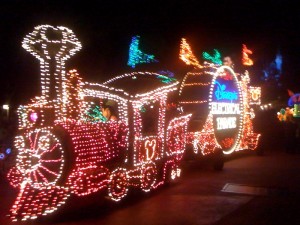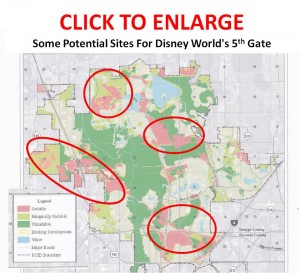This is the second page of this entry. For the first page, click here.
 JIM HILL PREDICTS A FIFTH GATE BY 2021
JIM HILL PREDICTS A FIFTH GATE BY 2021
As noted a week or so ago, Jim Hill speculated recently at the end of this article that Disney World will open a whole new fifth park sometime near its 50th anniversary in 2021.
Jim Hill is usually reliable on what people at Disney are actually talking about and working on.
That does not mean, however, that what he reports must come true.
Like any other creative business, Disney generates many more ideas than it can possibly act on (and discusses these ideas…and thus engenders rumors).
So a fifth park by 2021 is a real possibility, but not even close to a certainty. And as explained here, the earliest official confirmation would come, in my judgment, is mid-2015.
Given that, there’s three things worth addressing whenever the fifth gate question comes up:
- Is there space?
- Aren’t there better things to do with the capital?
- Won’t the new park have horrible economics from cannibalization?
IS THERE SPACE FOR A FIFTH PARK AT WALT DISNEY WORLD?
There’s an enormous amount of empty space at Walt Disney World.
However, most of it is geologically unusable, reserved for conservation/storm water management, swampland, or all three.
That said, Disney’s land use planning arm, the Reedy Creek Improvement District (RCID), has published maps showing areas appropriate for future development.
There’s at least four areas big enough for a new theme park.
On the RCID map, the most developable spaces are in red, and then yellow green. Least developable are the dark green spaces.
Four areas strike me as having enough good land to contain a new park: one to the west of the Magic Kingdom, one between the TTC parking lot and Fort Wilderness, one to the northwest of the Animal Kingdom, and one to the east of Wide World of Sports.
Any of these but maybe the last is big enough for a massive new park and associated development–hotels and such.
But consider that technology may greatly reduce ride footprints, waiting areas, guest support and circulation spaces, and backstage areas.
Consider the footprints of rides like Toy Story Mania and Star Tours, compared to, to take the extreme, the land that the Jungle Cruise and Kilimanjaro Safaris take up. Deployment of screen-based rides for the fifth gate can reduce the amount of land it requires.
Then consider Disney’s NextGen technology, which has many components but key among them is the opportunity to “reserve” a time to visit a ride. A park designed with this approach in mind from the start can greatly reduce the areas devoted to waiting lines.
And consider a possible evolution of NextGen: from scheduling just rides and meals and such to defining a beginning and ending time to be in a park itself. If the fifth gate opens as a half-day park, then some families can schedule all of their experiences in it to go from 9a til 1p, others 10a to 2p, others from 4p til 9p, etc.
If this is possible, the new park can be fully utilized all day with smaller infrastructure–fewer ticket booths, less wide walkways, fewer restrooms, etc, as the peak hourly crowds it needs to be designed for will be smaller than would those at a park where people arrive randomly.
And smaller ride footprints, smaller waiting areas and smaller support infrastructure will tend to lead to smaller backstage areas.
So the fifth gate may need much less space than at first seems to be the case.
AREN’T THERE BETTER WAYS TO SPEND THE MONEY?
Another objection to a fifth gate is to wonder why bother when other parks–particularly Epcot, but also the Studios, could use a refreshening?
This objection becomes even more poignant when to potential for Avatar-land to hoover up most of the Disney World capital over the next few years is put into the mix. It’s also related to the cannibalization point, which I’ll come back to next week.
Fans and frequent visitors tend to notice when a park has empty space, unused buildings, and rides that haven’t changed for decades–or changed for the worse recently!
This is not how precisely how Disney thinks about investing in new rides.
Jay Rasulo laid out Disney’s investing philosophy pretty explicitly at the September Goldman Sachs Communacopia Conference. And, as former head of Parks and Resorts and current CFO, he oughta know…
“…I don’t believe that as a park gets older, it necessarily needs more…capital to…keep it alive. If you think about…the Magic Kingdom, that park went almost 40 years with nothing of major significance being added to it, and it’s still the number one theme park in the world….As we look at these things…it’s from a capacity perspective–is the place overcrowded…[or] are…the attractions in that park not as repeatable as others? And so it’s a lot more sophisticated than…’over time, this thing is going to need more work.’ “
So the upshot is that Disney adds major new attractions when a park gets too crowded or when its repeatability rankings suffer, either absolutely or in comparison. Reportedly, it’s the repeatabilty issue that led to plans to enhance the Animal Kingdom.
So what does a new park do? It increases capacity in all of Disney World, both by providing its own new capacity and by pulling visitors away from the other four Disney World theme parks…and it increases the repeatability of a trip to Walt Disney World.
WON’T CANNIBALIZATION KILL THE ECONOMICS OF THE FIFTH GATE?
This material continues here.
PAGES: Previous | 1 | 2 | 3 | Next
Follow yourfirstvisit.net on Facebook or Google+ or Twitter or Pinterest!!

Leave a Reply
2 Comments on "Avatar, Disney’s Animal Kingdom, and Walt Disney World’s 5th Park, Continued"
I think the timing of a fifth park to concide with the fifty year aniversary would make a lot of sense. One lesson learned from Epcot is that ‘future’ concepts can age quickly. I think a Villian theme, complimented with a Star Wars segment, would serve Disney well.
Both themes are timeless and fit Disneys overall strategy. Marvel would be great as well, but I thought Universal has “PARK” rights of Marvel in Florida? Great article thanks.
Jay